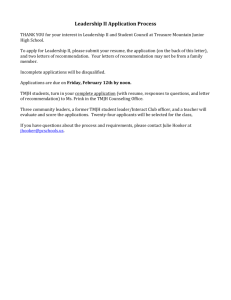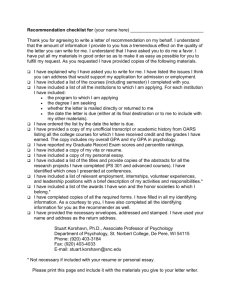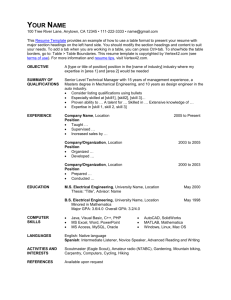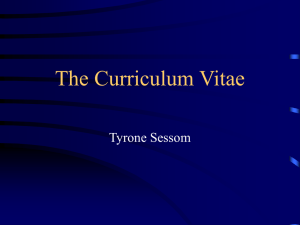Successful Graduate Applications: How and What
advertisement
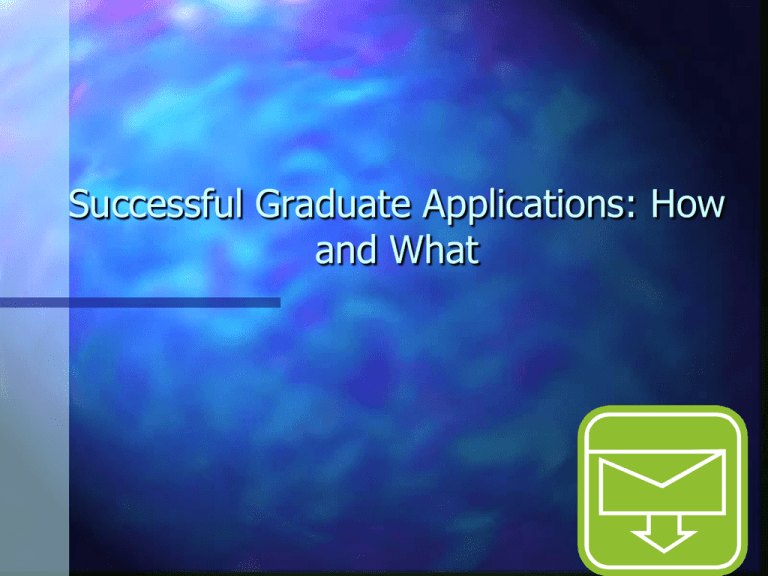
Successful Graduate Applications: How and What Your Application Starts Before You Apply Email faculty with inquiries regarding -research -training -special interests The “A List” -Ask (about research, training, interests) -Acknowledge (acknowledge and thank) -Anticipate (express interest in contact) -Alert (about potential application) Personal Statements, Resumes and Letters of Recommendation The Seven Components of Graduate Application Volume of Graduate Applications and Review Procedure Overall Components of Graduate Applications Application form GPA GREs Transcripts Personal Statement Letters of recommendation Vita Volume and Review of Graduate Applications 200 applicants x 15min = 300 min / 60min= 50 hours of admission’s review per faculty This is only ONE of roughly 10 steps in the overall review process -wait for deadline for materials -review all folders -meet to discuss -review and identify top 30-40 -select and schedule interviews -conduct interviews (phone or on-site) -discuss -identify top 20-30 and rank order -submit for funding programs -notify you of acceptance or status Other Time Constraints Needs to happen within a 6-8 week window during which other duties still impinge- e.g., -supervise doctoral advisees, theses and dissertations, conduct, develop, propose, defend, research, clinical supervision, edit and review books and journals, service at departmental, college, university and national levels, teach two or more courses, write and submit grants, and do admissions. Overall faculty workweek = 56 hours Result Time dedicated to the review of your folder is likely to be 15 minutes or less Time per Component 1 to 2 rule: each component of your application will be reviewed for approximately 1-2 minutes Application < 1 min GREs <1 min (V, Q, T, Subject, analytical, retakes) Transcript- 1-2 min (GPA: overall, last 2 years, major, statistics and research) Personal Statement (2-3 min) 3 letters of recommendation (2 min each) Vita - 1 to 2 minutes Objective vs. Subjective Components Application, GREs and Transcripts/GPA = “objective” components resume, personal statements and letters of recommendation = “subjective” components each provides some distinctive information and built-in redundancy Objective Components GPA: Overall, last 2 years, in the major GRE: Verbal and Quantitative Subjective Components: Resume Purpose- to clearly display in synoptic form the information and experience that qualifies you for graduate study Use high quality, white, bond paper It will be reviewed for ~1-2 min, so limit to 2 pages + C.V. Likely to be consulted again prior to interview Resume Name and Contact information Educational Background Clinical Experience Research Experience Presentations and Publications Honors and Awards References Course Listings Resume Name and Contact information - top center - include email, phone, fax - boldface in slightly larger type (18+pt) Resume Clinical Experience - what counts? Peer counseling crisis center volunteer work in nursing homes working in nursery habitat for humanity -list dates -if supervised, describe & list supervisor Resume Research Experience: short narrative accounts of research experiences -class projects (e.g. in lab courses) -independent research -senior/honor’s thesis Resume Publications and Presentations -papers completed (like senior thesis) -paper presentations -publications -list author(s), title, and presentation venue or publication outlet Resume Awards and Honors scholarships recognitions or awards leadership positions Dean’s or President’s Honor role do NOT include High School Honors Resume References -identify three or four people to contact -get prior approval from them to serve as references for you -provide complete contact information -use strategically to augment written letters of recommendation Resume Course listings -provides opportunity to “package” yourself -do NOT rely on transcripts to do this for you -identify four or five clusters of courses such as foundation in psychology, research methods and statistics, clinical and personality, assessment, specialty courses, women’s issues, mental health, M & F, etc.- don’t forget to include any special topics or independent research courses- include grades, if good -paperclip as a single page onto the back of your vita -don’t worry about redundancy Resume: What Not to Include Hobbies, pets, favorite books or movies, workshops attended, numerous extracurricular duties/activities consider that your resume will be reviewed for only 1-2 minutes; during that short time, what do you want the reader to see most? Sample Vita Personal Statement Purpose: to present yourself effectively and to make the connection between your interests and the program to which you are applying -don’t depend on the reader to make this connection- do not stop with “I’m an excellent and interested person”- take the Personal extra step: “why I would be a Statement good fit for your program” Personal Statement Ordinarily only 1 to 2 pages, and no two are alike start with broad statement, usually with H.S. or college Then focus on specific experiences, events, and opportunities that have sharpened your focus and interests Personal Statements Use “upbeat words” and expressions -e.g., “excellent”, “terrific opportunity”, “very pleased to have been chosen”, “gratified to have been selected for…”, “surprised at how excited and interested I was in…” Personal Statement Identify current research interests (get tagged by these) and two or three faculty you might like to work with -natural if you have already emailed faculty -do not list everyone -check to make sure they are “core” faculty (every program has extensive affiliate faculty who would not ordinarily pick up students) Personal Statements: Style Enthusiasm Humility Focus and dedication Personal Statement: Style Do not stretch, modify, or enhance anything, including your level of interest in research if that is not true- recipe for disappointmentDo not try to sound “smart” or prove yourself- just be yourself Attribute flattering things about yourself to sources other than yourself, e.g., “A number of my faculty have noted the level of dedication and initiative that I have taken in my work, and I have been gratified to have been chosen to serve as the head of the research team.” Personal Statement Read the statement out loud. Time it. Give it to friends to read (does it sound like you?). Give it to a faculty member to read and provide feedback on. Ask him/her what overall impression it leaves? “On a scale of 1 to 10, how would he/she view this statement?”- How could you improve it? Letters of Recommendation Purpose: to secure outside evaluations of you from sources that most closely approximate the faculty with which you will be working. Includes professional, personal, and interpersonal commentaries. Research demonstrates that letters of recommendation are the single Letters of Recommendation most important source of “subjective” information in your application Choosing Letter Writers Knowing this, choose carefully First, how many: 3-4 Second, who: academic, clinical, research All Ph.D. or co-signed by Ph.D. No politicians, family friends, practicing therapists, etc. University faculty or staff. A word about adjunct, assistant, associate, professor- do a SSI count Letters of Recommendation Choose people who know you well, who can speak to different aspects of your experience, and who can and will take the time to write a strong letter ask, “Would you be willing to write me a strong letter of recommendation for graduate study in psychology?” Provide Letter Writers With: Thumbnail sketch that includes -name and contact info -how they know you -your GRE and GPAs - bulleted items that you want them to include e.g. Psi Chi president, APA convention, focused area(s) of study, honors or awards -redundancy is fine Provide Letter Writers With: Prominent deadline for completion, one week earlier than earliest deadline Provide a complete list of ALL schools and addresses at one time, if possible be sure to identify the type of program, (counseling, clinical, developmental, BN, Social, etc.), and call attention to any differences in this regard- stating the wrong program can be “kiss of death” Letters of Recommendation If letter writers give you an opportunity to review and revise, take it -add anything you want -delete only fact errors -return hard and disk copy to writer with new file clearly marked; “revised letter” Other Possible Inclusions Published papers (seeing is believing) Senior thesis (check with faculty) Final Words Now your materials are off and you can prepare for your interviews. Not a time to be passive- email any faculty you have had contact with and indicate that you have “very much appreciated the contact that you have had with them and, in part based on that experience,you have decided to apply to their program.” Final Words In addition, email two or more grad students from the program to get their take on the program “what has your experience been like so far?” “In what way has the program met your expectations and in what ways is it different”, etc. Final Words The entire purpose of applying is to get an interview. Period. You are more likely to get an interview if your file is viewed as a person, rather than as another “unknown applicant”. So advance contact by phone or email is one of the biggest things you can do to advance your graduate application.
